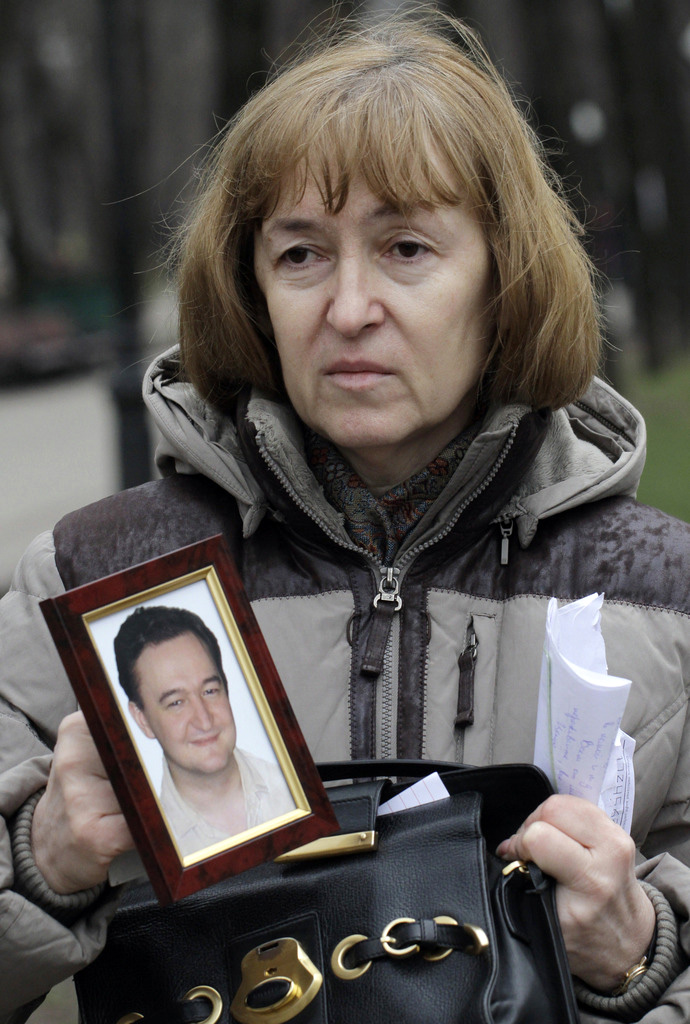
Shadow of Magnitsky case reaches Switzerland

The case of Sergei Magnitsky, the anti-corruption lawyer who died a lonely and agonising death in a Moscow prison cell, has become an international cause celebre. Campaigners for justice have followed part of the money trail to Switzerland.
While working for an American law firm in Moscow in 2007, Magnitsky uncovered the largest tax refund fraud in Russian history, involving the theft of companies belonging to his client Bill Browder, formerly one of the most successful foreign investors in Russia through his firm Hermitage Capital Management.
For his efforts the 37-year-old lawyer was falsely arrested and held in pre-trial detention for 11 months, where he suffered torture and medical neglect resulting in his death in November 2009.
This version of events, accepted by the United States, the European Parliament, Amnesty International and the Russian opposition movement, is still disputed by the Russian authorities, who are pressing ahead with a posthumous prosecution of Magnitsky. A preliminary hearing is scheduled for January 28.
Earlier this month, the Swiss Federal Prosecutor’s Office announced it was freezing additional accounts in connection with its money laundering investigation into “persons unknown” in the Magnitsky case. This is the first public move since prosecutors blocked related accounts in March 2011.
The office declined to give details of the investigation other than to say that it was “continually turning up new findings that require additional examination”. The Russian government has not commented officially on the Swiss prosecutors’ move.
The Swiss Financial Market Supervisory Authority (Finma), which has yet to make a public statement on the Magnitsky case, declined to comment, confirming only that it had received references “in this context”, which it was treating “in the appropriate way”.
American-born Bill Browder moved to Russia in 1996 where he ran the successful investment fund Hermitage Capital Management.
From an unusual background, his grandfather was general secretary of the American Communist Party and his father was born in Russia.
“During my teenage rebellion I thought what’s the best way to rebel in a family of communists, and I put on a suit and tie and became a capitalist.”
Hermitage Capital Management went from strength to strength in Russia up until 2005 when Browder was expelled from the country without warning.
During Browder’s absence from Moscow, his company offices were raided by interior ministry police. The documents and seals confiscated in the raids were later used to steal Browder’s companies (similar to identity theft) which later secured fraudulent tax refunds.
This fraud was discovered and reported to the authorities by local lawyer Sergei Magnitsky, acting for Browder, a move which ultimately cost him his life.
Browder, now a British citizen and based in London continues to run Hermitage Capital Management, an investment fund specialising in emerging markets – except Russia.
He helped set up the website, Russian untouchables – Justice for Sergei Magnitsky.
Follow the money
Although Magnitsky is gone, the $230 million (SFr214 million) fraudulent tax rebate he uncovered left a trail which has been vigorously pursued by Browder.
“We said if we can’t get justice inside of Russia let’s at least seek some kind of justice outside of Russia. Let’s follow the money,” Browder told swissinfo.ch.
“And that’s what we did. Over a three-year period, together with a number of different investigators, journalists and other people who have access to bank and financial information, we pieced together where about $135 million of the $230 million went.”
One of Browder’s sources of information and a key witness interviewed by Swiss prosecutors was 44-year-old Alexander Perepilichnyy, who died under unexplained circumstances in London in November 2012.
His death prompted this response from the Swiss Federal Prosecutor’s Office: “Concerning the death of Mr Perepilichnyy and its consequences on the criminal proceedings, we’d like to point out that our strength resides in our ability to minimise the influence of such a regretful event on our investigation.”
Browder was first approached by Perepilichnyy in the summer of 2010. “He came to us with a pile of documents which proved that roughly €8 million went into the accounts of the family members of the [Russian] tax authority woman who approved the largest part of the fraudulent tax rebate. That money ended up in Credit Suisse Private Bank in Zurich.”
The criminal complaint with this information was filed in Bern in January 2011. Seven other jurisdictions have received similar criminal complaints about money laundering – Lithuania, Latvia, Estonia, Finland, Cyprus, Austria and Hong Kong.

More
Switzerland awash with money laundering cases
Mini Cold War
Meanwhile the repercussions of the case continue to weigh heavily on relations between the United States and Russia.
The Magnitsky Act, which observers agree was almost single-handedly lobbied into existence by Browder, was signed into law in the US in December. It imposes an asset freeze and visa ban on 60 Russians implicated in Magnitsky’s death.
Russian President Vladimir Putin called the act “unfriendly” and struck back with an adoption ban for US citizens which was rushed through parliament at the end of December, and Russia’s own visa blacklist of 60 US citizens.
The story is far from over, considering Browder’s aims for 2013. “One of our big objectives is to get the Magnitsky Act passed on an EU-wide level this year. The other objective is to make sure that every country where the money flowed from this crime opens up a major criminal case and freezes all the money involved.”
Browder’s calls are falling on fertile ground. In a October 2012 resolution European parliamentarians asked the EU Council of Ministers to draw up a list of officials “responsible for Mr Magnitsky’s death in custody, the subsequent cover-up and harassment of his family”. An EU-wide visa ban should be imposed on these officials, the resolution said, and their EU assets and those of their families should be frozen.
The Magnitsky case has not sparked much debate on the Swiss political scene to date.

In compliance with the JTI standards
More: SWI swissinfo.ch certified by the Journalism Trust Initiative































You can find an overview of ongoing debates with our journalists here . Please join us!
If you want to start a conversation about a topic raised in this article or want to report factual errors, email us at english@swissinfo.ch.